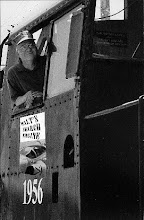World War II 'Spy in the Sky' dies
 World War II 'Spy in the Sky' dies
World War II 'Spy in the Sky' diesBy Walter Haan
Jean L. Chase, author of The Grasshopper That Roared, published by Southfarm Press in 2005, died on February 11, 2008 at age 86. He was born June 16, 1921 in McMinnville, Oregon. He served in the Army for 20 years and saw service in the Pacific as an L-4 Piper Cub artillery spotter pilot during World War II. He served in Korea after that.
I was going through papers involved with the publication of his book looking for material about Jean that I could share with you about him. We had talked many times on the phone in 2005 before our publication of his book that November. I came across his suggested epilogue for his book, most of which we didn’t use. Now that he is gone, it seems like his own words are the fitting epilogue for him personally.
“The Army was good to me. It taught me self discipline, how to approach a problem in a logical sequence and that there is no job you cannot accomplish. But most of all it taught me how to think.
“I can’t say that I enjoyed every minute of my service, but there were many exciting and beautiful things that I experienced. After retirement I observed many young men working in banks and business that would be stuck in that position for the rest of their lives. The same old thing every day. I pondered how much of life would they really miss?
“I was afforded the opportunity to see a large part of the world. My education, from a flying standpoint, operating in the mountains, desert, jungle and the flat land of Mid-America, was invaluable to me as a pilot. I learned the hazards of the thunderstorms in the south, the heat and cold of the desert and the high humidity of the jungle that could produce a quart of water in a half filled gas tank overnight.
“These were things we learned that helped keep us alive, and sometimes we learned them the hard way.
“I was just an ordinary guy that got up in the morning, went out to my little old Piper Cub and then took off on a combat mission, like hundreds of other pilots in those horrible days of war. The mission was primary in mind at all times. I was just going to work.
“I have awakened in the morning at home since my retirement, sat on the edge of the bed and thought, ‘What if today, I had to go out and climb into a plane and take off, knowing full well that I would be shot at that morning.’
“A chill would go up my spine.
“Whenever I would get a little skittish about flying a combat mission, I would think about that poor infantry guy on the ground who was depending on me to keep the enemy artillery from firing by just flying around overhead. That was pretty easy to do, compared to what the soldier faced on the ground.
“The advancement in Army Aviation has been tremendous since World War II. But Army pilots should never lose sight of the fact that their only reason for being is for the guy on the ground that takes the real estate.
“I knew deep down, when I retired, that I would probably not ever fly again. I love it, but my experience in Mississippi where I had a number of close associations with civilian pilots, taught me that flying now and then on weekends was not for me. I knew how much you lost when you only flew occasionally and I knew how sharp you could be when you flew almost every day.
“The things I prized most, that I received from my short 18 years as a Liaison Pilot and Army Aviator, is not the decorations or the satisfaction of fighting for my country. It is the friendships I have made and the comradeship I received during those wonderful years. You always knew that you were never alone.
“My comrades and I will meet again at that great Cub Strip in the sky that is open both ends, wide, with no pot holes to dodge or ditches along the sides, where the wind is never gusty, it is always straight down the runway and the sun never stops shining.
“When my granddaughter Heather was seven years old, she asked me if I would drive her and a friend to a birthday party. As we were waiting outside the friend’s house, a civilian model of the L-17 flew across the sky in front of us. I commented that I had flown that type of aircraft in the Army.
“When the little friend came out to the car, we started for the birthday party. Out of a clear blue sky my granddaughter suddenly spoke.
“'You know my granddad was a good pilot when he was flying in the Army.’
“'How would you know? You weren’t even around when he was flying,’ the friend replied, looking down her nose at Heather.
“Heather looked her straight in the eye when she answered.
“'He’s alive isn’t he?’”
Thank heaven Jean L. Chase and other Army Aviation pilots like him, our spies in the skies during World War II, were alive when we needed them. Read The Grasshopper That Roared, www.war-books.com/grasshopper.htm. You won’t be bored or disappointed. There are so many good stories such as the time Chase was almost run over by his own Cub. Or the time he rode in a Cub’s back seat raking a Japanese campsite with his machine gun stuck out the window. Or the time he fulfilled his spotter duties in a torpedo plane off the escort carrier USS Fanshaw Bay. He was a remarkable man.—Copyright 2008 by Walter Haan, www.war-books.com

